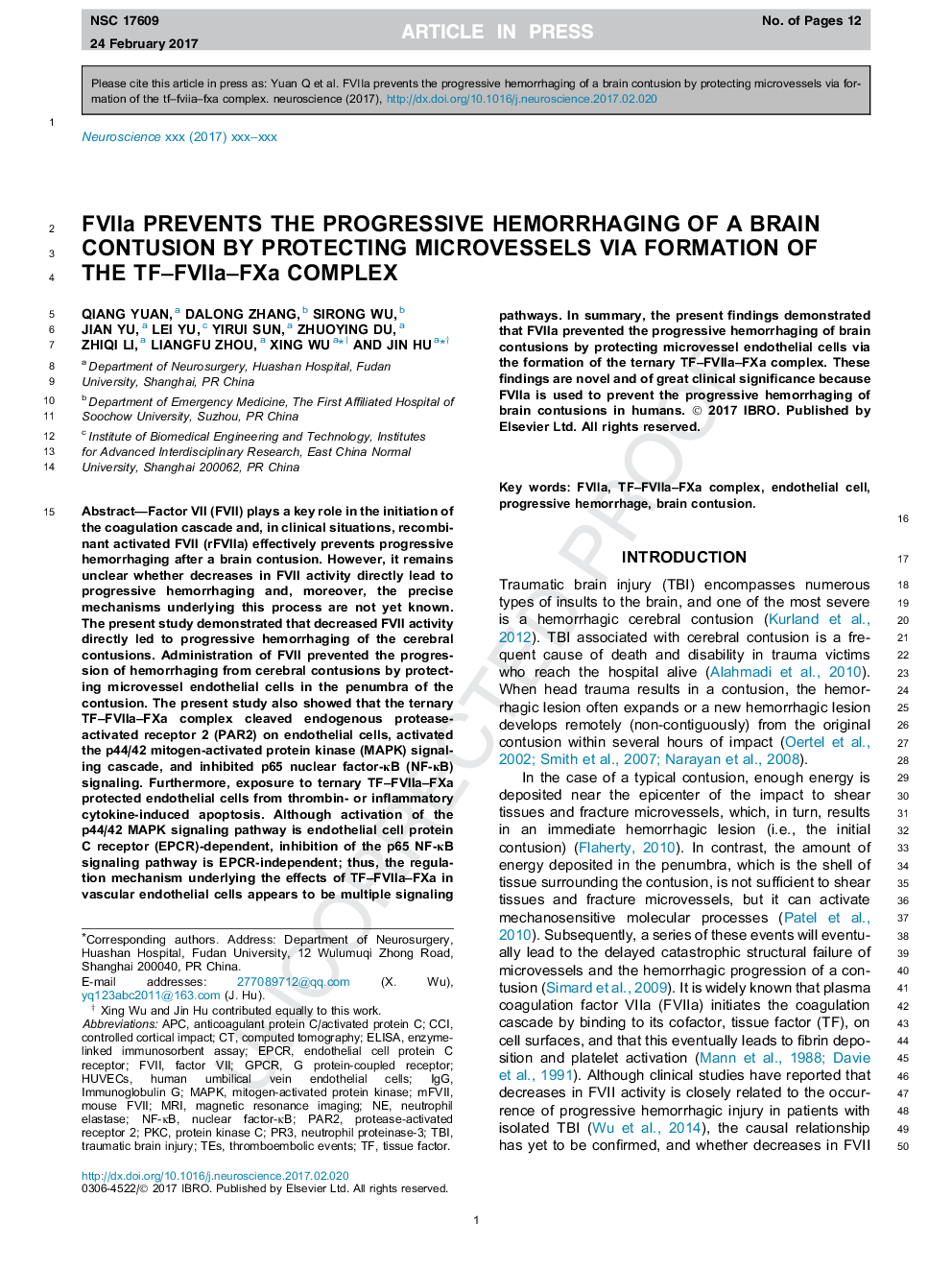| کد مقاله | کد نشریه | سال انتشار | مقاله انگلیسی | نسخه تمام متن |
|---|---|---|---|---|
| 5737795 | 1614728 | 2017 | 12 صفحه PDF | دانلود رایگان |
عنوان انگلیسی مقاله ISI
FVIIa prevents the progressive hemorrhaging of a brain contusion by protecting microvessels via formation of the TF-FVIIa-FXa complex
دانلود مقاله + سفارش ترجمه
دانلود مقاله ISI انگلیسی
رایگان برای ایرانیان
کلمات کلیدی
CCIendothelial cell protein C receptorTBIFVIIaPR3FVIIPAR2EPCRPKCGPCRAPCHUVECSNF-κBTESIgGMAPK - MAPKTraumatic brain injury - آسیب تروماتیک مغزneutrophil elastase - الاستاز نوتروفیلMRI - امآرآی یا تصویرسازی تشدید مغناطیسیimmunoglobulin G - ایمونوگلوبولین GELISA - تست الیزاEnzyme-linked immunosorbent assay - تست الیزاMagnetic resonance imaging - تصویربرداری رزونانس مغناطیسیcomputed tomography - توموگرافی کامپیوتری یا سی تی اسکن یا مقطعنگاری رایانهایthromboembolic events - حوادث ترومبوآمبولیکEndothelial cell - سلول های اندوتلیالHuman umbilical vein endothelial cells - سلول های اندوتلیالی ورید ناف انسانTissue factor - عامل بافتFactor VII - فاکتور VIInuclear factor-κB - فاکتور هسته ای κBProtein kinase C - پروتئین کیناز سیmitogen-activated protein kinase - پروتئین کیناز فعال با mitogencontrolled cortical impact - کنترل قشر مغزیBrain contusion - گرفتار مغزprotease-activated receptor 2 - گیرنده فعال فعال پروتئاز 2G protein-coupled receptor - گیرندههای جفتشونده با پروتئین جی
موضوعات مرتبط
علوم زیستی و بیوفناوری
علم عصب شناسی
علوم اعصاب (عمومی)
پیش نمایش صفحه اول مقاله

چکیده انگلیسی
Factor VII (FVII) plays a key role in the initiation of the coagulation cascade and, in clinical situations, recombinant human activated FVII (rFVIIa) effectively prevents progressive hemorrhaging after a brain contusion. However, it remains unclear whether decreases in FVII activity directly lead to progressive hemorrhaging and, moreover, the precise mechanisms underlying this process are not yet known. The present study demonstrated that decreased FVII activity directly led to progressive hemorrhaging of the cerebral contusions. Administration of FVII prevented the progression of hemorrhaging from cerebral contusions by protecting microvessel endothelial cells in the penumbra of the contusion. The present study also showed that the ternary TF-FVIIa-FXa complex cleaved endogenous protease-activated receptor 2 (PAR2) on endothelial cells, activated the p44/42 mitogen-activated protein kinase (MAPK) signaling cascade, and inhibited p65 nuclear factor-κB (NF-κB) signaling. Furthermore, exposure to ternary TF-FVIIa-FXa protected endothelial cells from thrombin- or inflammatory cytokine-induced apoptosis. Although activation of the p44/42 MAPK signaling pathway is endothelial cell protein C receptor (EPCR)-dependent, inhibition of the p65 NF-κB signaling pathway is EPCR-independent; thus, the regulation mechanism underlying the effects of TF-FVIIa-FXa in vascular endothelial cells appears to be multiple signaling pathways. In summary, the present findings demonstrated that FVIIa prevented the progressive hemorrhaging of brain contusions by protecting microvessel endothelial cells via the formation of the ternary TF-FVIIa-FXa complex. These findings are novel and of great clinical significance because FVIIa is used to prevent the progressive hemorrhaging of brain contusions in humans.
ناشر
Database: Elsevier - ScienceDirect (ساینس دایرکت)
Journal: Neuroscience - Volume 348, 21 April 2017, Pages 114-125
Journal: Neuroscience - Volume 348, 21 April 2017, Pages 114-125
نویسندگان
Qiang Yuan, Dalong Zhang, Sirong Wu, Jian Yu, Lei Yu, Yirui Sun, Zhuoying Du, Zhiqi Li, Liangfu Zhou, Xing Wu, Jin Hu,